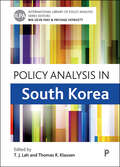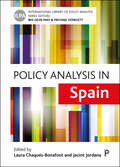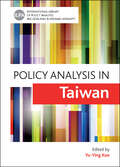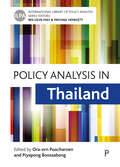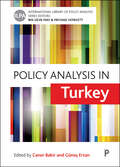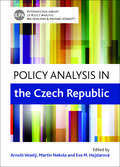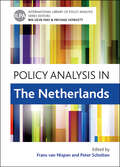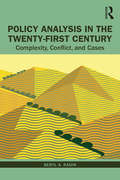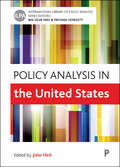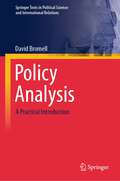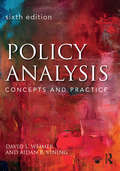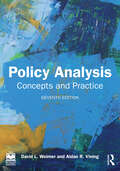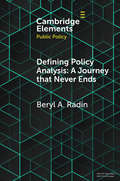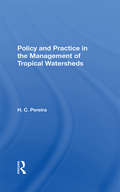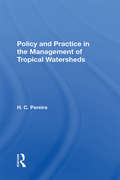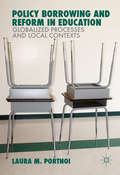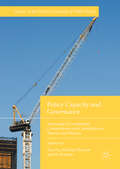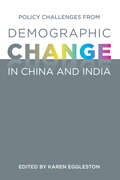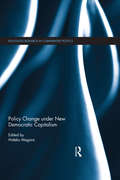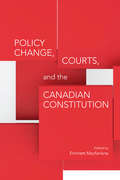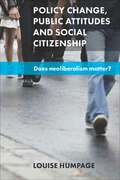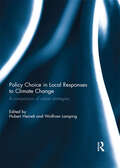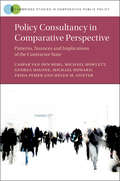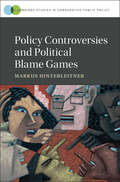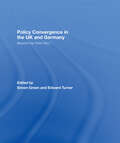- Table View
- List View
Policy Analysis in South Korea (International Library of Policy Analysis)
by T.J. Lah and Thomas R. KlassenThe industrialisation and modernisation in South Korea that followed the Second World War resulted in rapid progress in economic development, public administration, social service provision and the establishment of modern public policy. Bringing together outstanding researchers, this book is the first to examine the theory and practice of policy analysis in South Korea. The volume explores the historical development of policy analysis, and procedures for decision making at different levels of government. Drawing on case studies, contributors consider the issues and players that affect executive and legislative branch policy analysis, as well as policy design and analysis in the public arena and the shifting role of policy and research institutes, think tanks and post-secondary institutions.
Policy Analysis in Spain (International Library of Policy Analysis)
by Laura Chaqués-Bonafont and Jacint JordanaThis book is the first systematic study of policy analysis activities in Spain. It provides a comprehensive overview of how policy actors, including politicians, think tanks, researchers, interest groups and experts, generate information for the policy-making process. The book explores how executive and legislative actors participate in the production of policy analysis and how all actors elaborate and disseminate information on policy analysis. Contributors consider the ways different policy actors are involved in the production of data and information about policy problems, the resources used to produce policy analysis and the type of analysis produced over time in different policy areas.
Policy Analysis in Taiwan (International Library of Policy Analysis ,5)
by Yu-Ying KuoThe study of policy analysis in Taiwan began in the 1970s; however while other countries have recognised the need for detailed examination of the theory and practice of policy analysis at different levels of government, Taiwanese studies have remained limited. This book brings together for the first time a team of experienced and highly respected researchers from across Taiwan with expertise in policy analysis theory and practice in specific areas of government as well as in non-governmental organisations. This is a well-structured volume which will be highly relevant for students and academics interested in understanding and analysing politics and policy making in Taiwan. Features of the ILPA series include: • a country-specific systematic study of policy analysis systems by government and non-governmental actors • a history of the country’s policy analysis, empirical case studies and a comparative overview of alternative approaches • a key reference collection for research and teaching in comparative policy analysis and policy studies
Policy Analysis in Thailand
by Ora-orn Poocharoen and Piyapong BoossabongThe subject of policy analysis in Thailand is less examined than in Western societies. This is the first English-language book to engage in a detailed, comprehensive and current study of policy analysis in Thailand. Providing a broad view of history, styles and methods, it examines policy analysis both within and beyond executive government, revealing the role of parties, the military and interest groups. It will be a valuable resource for policy analysis researchers and practitioners, and as a comparison with other volumes in the International Library of Policy Analysis series.
Policy Analysis in Turkey (International Library of Policy Analysis ,14)
by Caner Bakır and Güneş ErtanThis volume provides the first comprehensive overview of the state of policy analysis in Turkey for an international audience. Noting Turkey’s traditionally strong, highly centralised state, the book documents the evolution of policy analysis in the country, providing an in-depth review of the context, constraints, and dominant modes of policy analysis performed by both state and non-state actors. The book examines the role of committees, experts, international actors, bureaucrats as well as public opinion in shaping policy analysis in the country through their varying ideas, interests and resources. In doing so, it presents the complex decision-making mechanisms that vary significantly among policy-making actors and institutions, documenting the key, yet unexamined, aspects of policy analysis in Turkey. It will be a valuable resource for those studying policy analysis within Turkey and as a comparison with other volumes in the International Library of Policy Analysis Series.
Policy Analysis in the Czech Republic (International Library of Policy Analysis ,8)
by Arnošt Veselý, Martin Nekola, Eva M. HejzlarováPolicy Analysis in the Czech Republic is a vital addition to the International Library of Policy Analysis series. It is not only the first comprehensive overview of the historical development and current state of policy analysis in the Czech Republic, but also in the post-communist Central and Eastern European region. As such, it provides a unique picture of policy analysis that in many respects profoundly differs from 'Western' policy analysis textbooks. Written by leading experts in the field – including practitioners – it outlines the historical development of policy analysis, identifies its role in academic education and research, and examines its varying styles and methods. This unique book offers indispensable reading for researchers, policy makers and students.
Policy Analysis in the Netherlands (International Library of Policy Analysis ,3)
by Frans van Nispen and Peter ScholtenThis comprehensive study, part of the International Library of Policy Analysis, edited by Iris Geva-May and Michael Howlett, brings together for the first time a systemic overview of policy analysis activities in the Netherlands. The Netherlands is internationally regarded as one of the front-runners of policy analysis and evaluation in Europe. This book provides a much-needed overview of developments in policy analysis in both academia and practice at various levels of governance. It brings together contributions from key scholars as well as from professionals in the field. The book captures the diversity of modes of policy analysis which have evolved since the 1970s. Above all, it provides an overview of the current state of affairs and is, as such, suitable for anyone who is interested in governance and performance. Features of the ILPA series include: • a systematic study of policy analysis systems by government and non-governmental actors • a history of the country’s policy analysis, empirical case studies and a comparative overview • a key reference collection for research and teaching in comparative policy analysis and policy studies
Policy Analysis in the Twenty-First Century: Complexity, Conflict, and Cases
by Beryl RadinThe field called policy analysis focused originally on the formulation of new policies and was structured to give advice to those in the top reaches of government agencies. Within several decades the field moved beyond the formulation stage of the policy process (creating new policies) to agenda setting, implementation, and evaluation of existing policies. New skill sets emerged and staff were found in many parts of the policy world. Despite these changes, there has been little attention paid to the possible shifts in the relationship between analysts and clients, and students of policy analysis often enter the world of work with little exposure to the situations they might face. Policy Analysis in the Twenty-First Century is designed to familiarize students with the diversity of experiences that they can expect to face in their practitioner role. Author Beryl Radin bases the discussion on case studies that illustrate realities in the current policy analysis environment. Set in very different environments (including both US and international settings), the players in the cases illustrate three different stages of a career (beginning the career, mid-career, and people at the end of their career). The cases are based on realistic situations and demonstrate the volatility and complexity of the decision environments. At the same time, they provide attention to the analysts’ personal values and career goals. This book will be required reading for faculty and masters level students in both public management and policy analysis classes. It may also be used in executive programs.
Policy Analysis in the United States (International Library of Policy Analysis ,12)
by John A. HirdPolicy Analysis in the United States brings together contributions from some of the world’s leading scholars and practitioners of public policy analysis including Beryl Radin, David Weimer, Rebecca Maynard, Laurence Lynn, and Guy Peters. This volume represents an indispensable companion to other volumes in the International Library of Policy Analysis series, enabling scholars to compare cross-nationally concepts and practices of public policy analysis in the media, sub-national governments, and many more institutional settings. The volume represents an invaluable contribution to public policy analysis and can be used widely in teaching at both graduate and undergraduate levels in schools of public affairs and public policy as well as in comparative politics and policy.
Policy Analysis: A Practical Introduction (Springer Texts in Political Science and International Relations)
by David BromellThis text for students of politics and public policy, and for learning on the job by new policy analysts, provides a practical introduction grounded in the author’s experience of working in public policy. In four concise chapters, Part I steps through doing policy analysis in practice: from clear commissioning and project planning, to doing analysis through collective thinking, to telling a compelling policy story, to peer review and quality assurance. The six chapters in Part II are a resource for reflective practice, introducing theory to address questions policy analysts confront in the course of their work. What is the purpose of politics and public policy? How do I know I am making a difference? How do I tackle working with stakeholders with different, competing, or conflicting interests? How might I navigate conflicting claims relating to identity and culture? And how can I balance responsiveness to current demands with responsibility to future generations? Every chapter closes with suggestions for group exercises and questions for individual reflection.
Policy Analysis: Concepts and Practice
by Aidan R. Vining David L. WeimerOften described as a public policy “bible,” Weimer and Vining remains the essential primer it ever was. Now in its sixth edition, Policy Analysis provides a strong conceptual foundation of the rationales for and the limitations to public policy. It offers practical advice about how to do policy analysis, but goes a bit deeper to demonstrate the application of advanced analytical techniques through the use of case studies. Updates to this edition include: A chapter dedicated to distinguishing between policy analysis, policy research, stakeholder analysis, and research about the policy process. An extensively updated chapter on policy problems as market and governmental failure that explores the popularity of Uber and its consequences. The presentation of a property rights perspective in the chapter on government supply to help show the goal tensions that arise from mixed ownership. An entirely new chapter on performing analysis from the perspective of a public agency and a particular program within the agency’s portfolio: public agency strategic analysis (PASA). A substantially rewritten chapter on cost–benefit analysis, to better prepare students to become producers and consumers of the types of cost–benefit analyses they will encounter in regulatory analysis and social policy careers. A new introductory case with a debriefing that provides advice to help students immediately begin work on their own projects. Policy Analysis: Concepts and Practices remains a comprehensive, serious, and rich introduction to policy analysis for students in public policy, public administration, and business programs.
Policy Analysis: Concepts and Practice
by David L. Weimer Aidan R. ViningOften described as a public policy "bible," Weimer and Vining remains the essential primer it ever was. Now in a thoroughly revised seventh edition, Policy Analysis provides a strong conceptual foundation of the rationales for and the limitations to public policy. It offers practical advice about how to do policy analysis, and goes a bit deeper to demonstrate the application of advanced analytical techniques through the use of case studies. Updates to this edition include: An all-new introductory case on corporate taxation; Consideration of addiction as a rationale for public policy; Discussion of public policy issues related to platforms and intermediation, especially to digital service delivery; Updated discussion of information gathering from the perspectives of internal and external validity; An updated British Columbia salmon fishery case. The textbook is supported by online materials for instructors, including suggestions for and examples of course policy projects, a project assessment template, sample instructions to students for preparing policy reports, as well as discussion questions and answers for each chapter. Cases that have been removed from the seventh edition remain available on the book’s webpage. Policy Analysis: Concepts and Practices remains a comprehensive, serious, and rich introduction to policy analysis for students in public policy, public administration, and business programs.
Policy Analysis: Theory and Practice (Elements in Public Policy)
by Beryl A. RadinFor much of its life, the field of policy analysis has lived with a wide range of definitions of its goals, work and significance in the society. This Element seeks to sort out these differences by describing the issues, players and developments that have played a role over the life of this field. As a result of the relationships that have developed an environment has emerged where both academics and practitioners who self identify as 'policy analysts' are not always recognized as such by others who use that same label. This Element explores the reasons why this conflictual situation has developed and whether the current status is a major departure from the past. While these developments may not be new or found only in policy analysis, they do have an impact on the status of the academics as well as the practitioners in the field.
Policy And Practice In The Management Of Tropical Watersheds
by H.C. Pereira H. C. PereiraThis book describes the upper watershed technologies and quotes successful examples. It is concerned with the less researched and often less-tractable land-use problems of rural areas involving the management of croplands, plantations, forests, and rangelands.
Policy And/spec Sale/avail Hard Only
by H.C. PereiraThe misuse and abuse of tropical watersheds in developing countries are a matter of concern to everyone working in development. Watersheds not only hold the key to erosion control, water storage and thus drought alleviation and agricultural success, but are also critical to downstream users. Using a combination of theory and practice, the author ex
Policy Borrowing and Reform in Education: Globalized Processes and Local Contexts
by Laura M. PortnoiThis book addresses the intersections of globalization, policy borrowing, and educational reform. Drawing upon multiple disciplines, it provides a comprehensive overview of globalization’s history, processes, theories, and trends, both generally and in education specifically. The book includes an in-depth discussion of policy borrowing, emphasizing its political nature, to provide an understanding of globalization’s impact on education. Portnoi interrogates the dominance of the Global North and the influence of the global governance organizations that serve as the core of the aid and development regime. Using a critical perspective, Portnoi emphasizes the manner in which local agents intervene to mediate the forces of globalization. The book provides a comprehensive foundation for students and scholars of comparative education and associated disciplines, including social foundations, educational policy, teacher education, higher education, globalization studies, sociology of education, and policy studies.
Policy Capacity and Governance
by Michael Howlett Xun Wu M RameshThis book provides unique insights into the role of policy capacity in policymaking and policy change, as it is being uncovered at the research frontier in contemporary policy studies. The book is structured into a series of sections on policy capacity in theory and practice, each focusing on a specific aspect of policy capacity and its influence on policy formulation, decision-making, implementation and evaluation. In addition to making a significant contribution to the body of literature on the theoretical approaches to researching the role of capacity in policymaking, it also provides practical examples of the application of these approaches through a variety of national and sectoral case studies. Including contributions from authors working in a wide variety of disciplines, the book demonstrates, across the various topics investigated, many commonalities and consistencies in relation to the study of policy capacity and policy-making. This work has interdisciplinary appeal and will engage scholars in fields ranging from geography to communications, health, social work and political science, amongst others with an interest in public policy.
Policy Challenges from Demographic Change in China and India
by Karen EgglestonThe world's two most populous countries face numerous policy challenges from rapid demographic change, including gender imbalance, population aging, and rapid urbanization. Drawing on social science expertise from China, India, and the United States, the contributors examine the social and economic challenges for policy across a range of domains, from family planning and old-age support to human capital investment, poverty alleviation, and broader issues of governance. Sections focus on: Policy challenges and economic impact Fertility and sex imbalance Human capital and urbanization Population aging
Policy Change under New Democratic Capitalism (Routledge Research in Comparative Politics)
by Hideko MagaraDemocratic capitalism in developed countries has been facing an unprecedented crisis since 2008. Its political manageability is declining sharply. Both democracy and capitalism now involve crucial risks that are significantly more serious than those observed in earlier periods. The notion of policy regimes has gained new significance in analysing the possibilities for a post-neoliberal alternative. Policy innovations directed towards an economic breakthrough require both political leadership and a new economic theory. The processes of political decision making have become quite distant from the public realm, and a limited number of economic and political elites exert influence on public policy. This book examines, from a policy regime perspective, how developed countries attempt to achieve such a breakthrough at critical junctures triggered by economic crises. It initially assesses the nature of the present crisis and identifies the actors involved. Thereafter, it provides an analytical definition of a crisis, stressing that most crises contain within them the potential to be turned into an opportunity. Finally, it presents a new analytical design in which we can incorporate today’s more globalized and fluid context.
Policy Change, Courts, and the Canadian Constitution
by Emmett MacfarlanePolicy Change, Courts, and the Canadian Constitution aims to further our understanding of judicial policy impact and the role of the courts in shaping policy change. Bringing together a group of political scientists and legal scholars, this volume delves into a diverse set of policy areas, including health care issues, the regulation of elections, criminal justice policy, minority language education, citizenship, refugee policy, human rights legislation, and Indigenous policy. While much of the public law and judicial politics literatures focus on the impact of the constitution and the judicial role, scholarship on courts that makes policy change its central lens of analysis is surprisingly rare. Multidisciplinary in its approach to examining policy issues, this book focuses on specific cases or policy issues through a wide-ranging set of approaches, including the use of interview data, policy analysis, historical and interpretive analysis, and jurisprudential analysis.
Policy Change, Public Attitudes and Social Citizenship: Does Neoliberalism Matter?
by Louise HumpageNeoliberal reforms have seen a radical shift in government thinking about social citizenship rights around the world. But have they had a similarly significant impact on public support for these rights? This unique book traces public views on social citizenship across three decades through attitudinal data from New Zealand, the United Kingdom and Australia. It argues that support for some aspects of social citizenship diminished more significantly under some political regimes than others, and that limited public resistance following the financial crisis of 2008-2009 further suggests the public ‘rolled over’ and accepted these neoliberal values. Yet attitudinal variances across different policy areas challenge the idea of an omnipotent neoliberalism, providing food for thought for academics, students and advocates wishing to galvanise support for social citizenship in the 21st century.
Policy Choice in Local Responses to Climate Change: A Comparison of Urban Strategies
by Hubert Heinelt and Wolfram LampingSince the 1990s ‘beliefs’, ‘ideas’ or ‘knowledge’ as well as processes of communicative interactions such as persuasion, argumentation and learning have received increasing attention in social science for the understanding of political changes. This book makes a significant contribution to this scholarly debate and will be of interest to practitioners, showing on one side how climate change has received more and more attention in policy making at the local level and changed the urban agenda and on the other how different the responses of cities to this global challenge are – and how these differences between cities can be explained. This book was previously published as a special issue of Urban Research and Practice.
Policy Consultancy in Comparative Perspective: Patterns, Nuances and Implications of the Contractor State (Cambridge Studies in Comparative Public Policy)
by Michael Howard Michael Howlett Helen M. Gunter Caspar van den Berg Andrea Migone Frida PemerMany Western countries have seen an increase in the volume and importance of external consultants in the public policy process. This book is the first to investigate this phenomenon in a comparative and interdisciplinary way. The analysis shows who these consultants are, how widely and for what reasons they are used in Britain, the United States, Canada, Australia, The Netherlands and Sweden. In doing so, the book addresses the positive and negative implications of high levels of external policy consultancy, including its implications for the nature of the state (transforming into a contractor state?) and for democratically legitimized and accountable decision-making (transforming into consultocracy?). It provides valuable new insights for students and practitioners in the fields of public administration, public policy, public management, political science and human resource management.
Policy Controversies and Political Blame Games (Cambridge Studies in Comparative Public Policy)
by Markus HinterleitnerIn modern, policy-heavy democracies, blame games about policy controversies are commonplace. Despite their ubiquity, blame games are notoriously difficult to study. This book elevates them to the place they deserve in the study of politics and public policy. Blame games are microcosms of conflictual politics that yield unique insights into democracies under pressure. Based on an original framework and the comparison of fifteen blame games in the UK, Germany, Switzerland, and the US, it exposes the institutionalized forms of conflict management that democracies have developed to manage policy controversies. Whether failed infrastructure projects, food scandals, security issues, or flawed policy reforms, democracies manage policy controversies in an idiosyncratic manner. This book is addressed not only to researchers and students interested in political conflict in the fields of political science, public policy, public administration, and political communication, but to everyone concerned about the functioning of democracy in more conflictual times. This title is also available as Open Access on Cambridge Core.
Policy Convergence in the UK and Germany: Beyond the Third Way?
by Simon Green and Edward TurnerPolicy convergence and policy learning have emerged as central themes in the study of public policy in recent years. This book complements the rich literature on theoretical aspects as well as individual case studies by undertaking a systematic comparison of policy convergence between two specific countries, the UK and Germany. Both are member-stat
